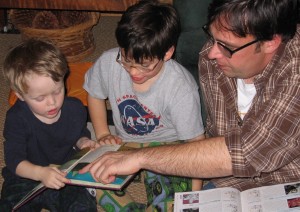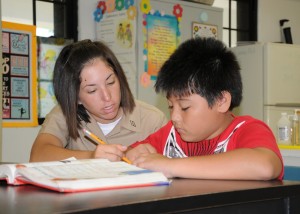Homework will always be a source of discussion and/ or tension between parents and children. Recently at my school, we invited parents and teachers to have a conversation regarding an update to our homework policy. Of course the discussion had to be respectful of the policy of the school board, but we still had some areas where we could modify or specify the wording for our own school policy.
We looked at different research papers, some of which are listed at the end of this article. The literature confirms that there is little evidence connecting the length of homework and school achievement. (1) (3) At best, for some students, there might be some minor improvement in test results. It is more likely that homework does not have a lasting effect on learning.
From our consultation, parents told us that what they dread about homework time is the fight that often results from asking the children  to do them. In French Immersion, parents are often told by their child : “Mom/ Dad you don’t know what I have to do” and then the exchange starts! In spite of the arguments, parents told us that they liked homework because it gave them a little insight on what their child is doing during the day. Most of the homeroom teachers at my school send a weekly email with the general outlines for the week but the homework makes it more “real”.
to do them. In French Immersion, parents are often told by their child : “Mom/ Dad you don’t know what I have to do” and then the exchange starts! In spite of the arguments, parents told us that they liked homework because it gave them a little insight on what their child is doing during the day. Most of the homeroom teachers at my school send a weekly email with the general outlines for the week but the homework makes it more “real”.
The other issue brought up was the importance given to homework when it comes back to school. Some parents reported that often their child complained that the homework were not even looked at in class. Often teachers will check but not mark it, which is in line with the ministry’s guideline document specifying that teachers should only mark what is done at school. Still we discussed the importance of reviewing or discussing homework assigned.
In conclusion, we decided to make it clear in our policy that work assigned as homework would be recognized and reviewed in class. No homework would be assigned during the family trips as it is rarely completed. Keeping a journal of the trip could instead be a fun activity and can be used to discuss the holiday when the child returns (discussing landscape, money, houses, villages, way of life … ) and it makes for a great keepsake for the child!
List of Reference Articles
- “Does Homework Improve Learning? – Alfie Kohn.” Alfie Kohn. Web. 17 Feb. 2015.
- “Membership.” Educational Leadership:Responding to Changing Demographics:The Case For and Against Homework. Web. 16 Feb. 2015.
- “Stanford Research Shows Pitfalls of Homework.” Stanford University. Web. 11 Feb. 2015.
- “What Research Says about the Value of Homework: At a Glance.” What Research Says about the Value of Homework: At a Glance. Web. 12 Feb. 2015.









